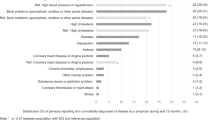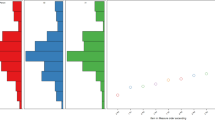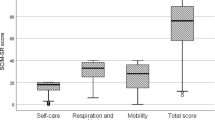Abstract
Study design:
Cross-sectional survey.
Objectives:
To examine factors that may enhance and promote resilience in adults with spina bifida.
Setting:
Community-based disability organisations within Australia.
Methods:
Ninety-seven adults with a diagnosis of spina bifida (SB) completed a survey comprising of demographic questions in addition to standardised self-report measures of physical functioning (Craig Handicap Assessment and Reporting Technique), resilience (Connor-Davidson Resilience Scale, 10 item), self-esteem (Rosenberg Self-esteem Scale), self-compassion (Self-compassion Scale) and psychological distress (Depression Anxiety Stress Scales, 21 item).
Results:
The majority (66%) of respondents reported moderate to high resilience. Physical disability impacted on coping, with greater CD-RISC 10 scores reported by individuals who were functionally independent in addition to those who experienced less medical co-morbidities. Significant correlations between resilience and psychological traits (self-esteem r=0.36, P<0.01; self-compassion r=0.40, P<0.01) were also noted. However, the combined contribution of these variables only accounted for 23% of the total variance in resilience scores (R2=0.227, F(5,94)=5.23, P<0.01).
Conclusion:
These findings extend current understanding of the concept of resilience in adults with a congenital physical disability. The suggestion is that resilience involves a complex interplay between physical determinants of health and psychological characteristics, such as self-esteem and self-compassion. It follows that cognitive behavioural strategies with a focus on self-management may, in part, contribute to the process of resilience in this group. Further large-scale and longitudinal research will help to confirm these findings.
Similar content being viewed by others
Log in or create a free account to read this content
Gain free access to this article, as well as selected content from this journal and more on nature.com
or
References
Craig A . Resilience in people with physical disabilities. In: Kennedy P, (ed.). Oxford Handbook of Rehabilitation Psychology. Oxford University Press: Oxford, pp 474–491 2012.
Kumpfer KL . Factors and processes contributing to resilience: the resilience framework. In: Glantz MD, Johnson JL, (eds).. Resilience and Development: Positive Life Adaptions. Kluwer Academic Publishers: New York, pp 179–224 2002.
Kilic S, Dorstyn D, Guiver N . Examining factors that contribute to the process of resilience following spinal cord injury. Spinal Cord 2013; 51: 1–5.
Huebner RA, Thomas KR . The relationship between attachment, psychopathology, and childhood disability. Rehabil Psychol 1995; 40: 111–124.
Padesky CA, Mooney KA . Strengths-based cognitive–behavioural therapy: a four-step model to build resilience. Clin Psychol Psychother 2012; 19: 283–290.
Barf HA, Verhoef M, Jennekens-Schinkel A, Gooskens RHJM, Prevo AJH . Life satisfaction of young adults with spina bifida. Dev Med Child Neurol 2007; 49: 458–463.
Bellin MH, Sawin KJ, Rouz G, Buran CF, Brei TJ . The experience of adolescent women living with spina bifida part 1: self-concept and family relationships. Rehabil Nurs 2007; 32: 57–67.
Neff ND . Self-compassion, self-esteem, and well-being. Soc Pers Psychol Compass 2011; 5: 1–12.
Neff KD . The development and validation of a scale to measure self-compassion. Self Identity 2003; 2: 223–250.
Leary MR, Tate EB, Adams CE, Batts AA, Hancock J . Self-compassion and reactions to unpleasant self relevant events: the implications of treating oneself kindly. J Pers Soc Psychol 2007; 92: 887–904.
Neff KD, Kirkpatrick KL, Rude SS . Self-compassion and adaptive psychological functioning. J Res Pers 2007; 41: 139–154.
Whiteneck GG, Charlifue SW, Gerhart KA, Overholser JD, Richardson GN . Quantifying handicap: a new measure of long-term rehabilitation outcomes. Arch Phys Med Rehabil 1992; 73: 519–526.
Connor KM, Davidson JRT . Development of a new resilience scale: the Connor-Davidson Resilience Scale (CD-RISC). Depress Anxiety 2003; 18: 76–83.
Rosenberg M . Society and the Adolescent Self-Image. Princeton University Press: Princeton, NJ. 1965.
Lovibond SH, Lovibond PF . Manual for the Depression, Anxiety and Stress Scales 2nd edn. Psychology Foundation: Sydney. 1995.
Fletcher JK, Brei TJ . Spina bifida: a multidisciplinary perspective. Dev Disabil Res Rev 2010; 16: 1–5.
Cohen J . A power primer. Psychol Bull 1992; 112: 155–159.
Bonanno GM . Loss trauma, and human resilience: have we underestimated the human capacity to thrive after extremely aversive events? Am Psychol 2004; 59: 20–28.
Shin M, Besser LM, Siffel C, Kucik JE, Shaw GM, Lu Chengxing L et al. Prevalence of spina bifida among children and adolescents in 10 regions in the United States. Pediatrics 2010; 126: 274–279.
White B, Driver S, Warren A-M . Considering resilience in the rehabilitation of people with traumatic disabilities. Rehabil Psychol 2008; 53: 9–17.
Acknowledgements
The authors are very grateful for the cooperation of the many organisations that participated in this research, in particular the Spina Bifida Association of South Australia and Disability SA who dedicated their time and staffing resources.
Author information
Authors and Affiliations
Corresponding author
Ethics declarations
Competing interests
The authors declare no conflict of interest.
Rights and permissions
About this article
Cite this article
Hayter, M., Dorstyn, D. Resilience, self-esteem and self-compassion in adults with spina bifida. Spinal Cord 52, 167–171 (2014). https://doi.org/10.1038/sc.2013.152
Received:
Revised:
Accepted:
Published:
Issue date:
DOI: https://doi.org/10.1038/sc.2013.152
Keywords
This article is cited by
-
Self-compassion, Resilience, Fear of COVID-19, Psychological Distress, and Psychological Well-being among Turkish Adults
Current Psychology (2023)
-
Self-Compassion Scale for Youth: Turkish Adaptation and Exploration of the Relationship with Resilience, Depression, and Well-being
Child Indicators Research (2022)
-
Positive Psychology for Mental Wellbeing of UK Therapeutic Students: Relationships with Engagement, Motivation, Resilience and Self-Compassion
International Journal of Mental Health and Addiction (2022)
-
Positive Psychology of Malaysian University Students: Impacts of Engagement, Motivation, Self-Compassion, and Well-being on Mental Health
International Journal of Mental Health and Addiction (2021)
-
Mindfulness-Related Variables and Sexual/Relationship Satisfaction in People with Physical Disabilities
Mindfulness (2020)



